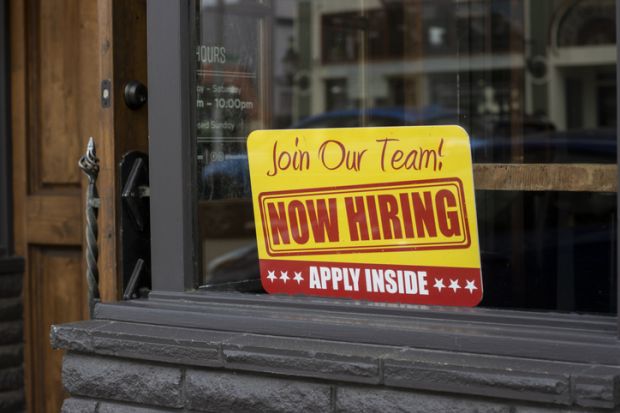UK employers have signalled their willingness to take on graduates even if their degree results have been delayed, but some professional bodies are being less flexible and students have been warned they have little legal recourse if things go wrong.
Accounting giant PwC has reassured its 1,600 graduates due to start roles in August or September that they can begin work as planned amid fears that students would lose out on opportunities because of the ongoing marking and assessment boycott.
The firm recently removed the requirement for new starters to obtain a 2:1 but still asks for them to have a degree. It said it was confident its recruitment process was robust enough to identify good candidates, regardless of what happens with their final marks.
Teach First, another major graduate employer, was similarly adamant that disruption be kept to a minimum.
“Our usual recruitment process is a robust assessment of candidate potential and academic grades to date, so we are confident that high standards in these circumstances will be maintained,” a spokesperson said.
“This enables us to provide the maximum number of high potential new teachers to schools in low-income communities where they are so badly needed, and we will verify degree grades when they are available.”
Other graduate employers were more circumspect. KPMG said it was “continuing to monitor the situation and will review options for those that might be impacted on a case-by-case basis” while BAE Systems said it was still “investigating any potential impact and exploring what provisions we can make to mitigate”.
Sector leaders have been lobbying employers to show flexibility in the face of the uncertainty, with thousands of students impacted by the industrial action.
Vivienne Stern, chief executive of Universities UK, said large employers seemed to understand the situation and are making accommodations. Professional bodies that regulate accreditation on to certain career paths were also being flexible, she added, although there had been “a few difficulties with a small number of professional bodies”.
Students in the healthcare sector were among those experiencing the most difficulties, due to the high level of regulation for those wanting to enter these professions.
A spokesperson for the British Psychological Society reiterated that its standards of accreditation remain in place despite the boycott.
“Concessions will not be made where there are ‘must take and must pass’ assessments, particularly in relation to doctoral programmes, or those which lead to specific practice-based roles,” a spokesperson said. “This is to ensure that standards are maintained and public safety is upheld.
“We understand that the current situation will be causing significant anxiety for students and trainees due to progress or qualify and also to the course staff themselves, and we would therefore urge that providers adopt a position that provides confidence and reassurance to them during this time.”
Elizabeth George, a partner in the employment team at the solicitor Leigh Day, said employers who had made offers to graduates conditional on achieving a set grade could easily dismiss that person if it later emerged they did not achieve this.
“You could terminate on notice and there would be no breach of contract claim,” she said. “It could be very short notice as it will be in the probation period which can be as little as one week.”
If a firm decides to keep the person on anyway, there “could be issues around taking on a graduate job that attracts a graduate salary and you don’t have a degree”, Ms George added.
“Interesting scenarios” could also arise if the person claims their grade performance was affected by the stress of the marking boycott or because of a disability, she said.
“Employers will be nervous, and the smaller employers might perhaps get into more difficulty,” according to Ms George. “Larger employers tend to have big HR teams and they will be alive to this issue, I’m sure.”




